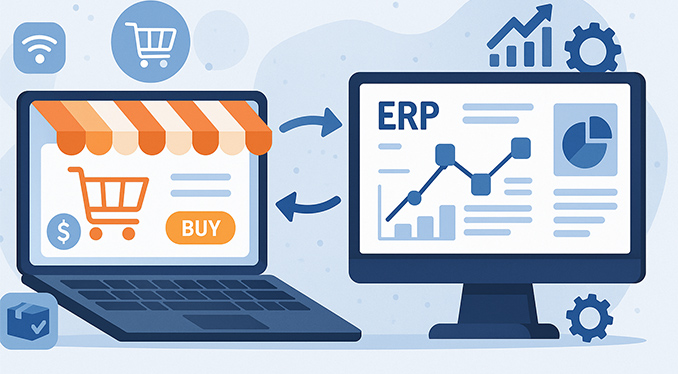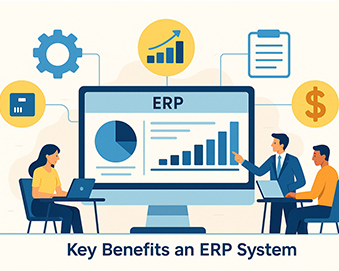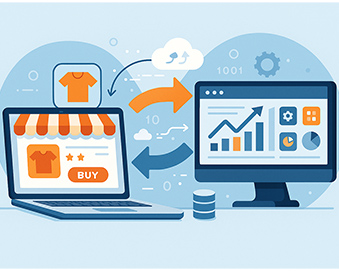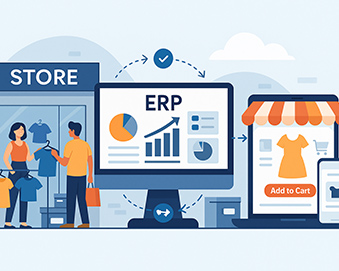
In today’s fast-paced digital world, businesses face intense competition and rising customer expectations. To stay ahead, companies need to streamline their operations, deliver outstanding customer experiences, and make data-driven decisions. Two powerful tools that can transform your business are e-commerce platforms and Enterprise Resource Planning (ERP) systems. Individually, they offer remarkable benefits—but together, they can revolutionize your business.
1. What is E-Commerce?
E-commerce refers to buying and selling goods or services over the internet. Modern e-commerce platforms go far beyond simple online storefronts; they offer everything from product management and marketing automation to personalized shopping experiences, secure payment gateways, and advanced analytics.
2. What is an ERP System?
An ERP system is a comprehensive software solution that integrates and manages core business processes, such as inventory, accounting, procurement, human resources, sales, and customer service. Instead of using separate software for each department, an ERP brings everything into a single, unified platform—ensuring consistency, real-time visibility, and better control over your operations.
Key Benefits of E-Commerce
a. Reach New Markets
With an e-commerce platform, your business is open 24/7 to customers around the world. There are no geographical boundaries, enabling you to scale your operations and tap into new revenue streams.
b. Improved Customer Experience
Personalized product recommendations, easy navigation, live chat support, and multiple payment options all contribute to a seamless shopping experience that keeps customers coming back.
c. Cost-Effective Operations
Running an online store reduces the need for physical retail space, lowers overhead costs, and automates routine tasks like order processing and inventory updates.
d. Actionable Insights
Modern e-commerce platforms offer robust analytics to help you understand customer behavior, measure campaign performance, and make informed business decisions.

Key Benefits of an ERP System
a. Streamlined Processes
By integrating various business functions, an ERP eliminates data silos, reduces manual data entry, and automates repetitive tasks—resulting in greater efficiency and fewer errors.
b. Real-Time Data & Reporting
Gain a 360-degree view of your business in real time. ERP systems provide dashboards and custom reports for better forecasting, budgeting, and strategic planning.
c. Improved Inventory Management
Track inventory levels, manage reordering, and optimize stock across multiple warehouses. This minimizes stockouts and overstocking, reducing costs and maximizing sales opportunities.
d. Regulatory Compliance
Stay compliant with financial regulations and industry standards. ERP systems can automate tax calculations, generate audit trails, and ensure accurate recordkeeping.

The Power of Integrating E-Commerce and ERP
While each solution is valuable on its own, integrating your e-commerce platform with your ERP system unlocks even greater benefits:
1. Unified Data and Automated Workflows
Integrating e-commerce and ERP means your online sales, inventory, order fulfillment, and financials are all connected. Orders placed online are instantly reflected in inventory counts, invoices, and accounting—no manual entry required. This reduces human error, speeds up order processing, and improves accuracy across the board.
2. Enhanced Customer Satisfaction
When your systems are in sync, customers get up-to-date information on product availability, shipping times, and order status. You can automate notifications, handle returns efficiently, and provide better after-sales support.
3. Better Decision-Making
With all your data centralized, you can generate more accurate and insightful reports. This helps you spot trends, identify bottlenecks, and make proactive decisions to grow your business.
4. Scalability
As your business grows, integrated systems can handle increased order volumes, expand to new sales channels, and support more complex operations—without adding unnecessary manual work or overhead.

Real-World Example
Consider an apparel retailer that sells products both online and in physical stores. By integrating their Shopify e-commerce store with an ERP like NetSuite or SAP, they can:
Sync inventory across all channels in real time.
Automatically update accounting records for each online sale.
Track customer purchase history for better marketing segmentation.
Reduce order fulfillment errors and speed up shipping.
This results in happier customers, lower costs, and more time to focus on growing the business.

Final Thoughts
E-commerce platforms and ERP systems are essential for modern businesses looking to thrive in a digital-first economy. By leveraging both—and especially by integrating them—you can create a more agile, efficient, and customer-centric operation that sets you apart from the competition.
If you’re ready to take your business to the next level, now is the perfect time to explore the possibilities that e-commerce and ERP integration have to offer.
FAQs
1. Why is integrating e-commerce with an ERP system important for businesses?
Integrating these systems unifies your data, automates workflows, speeds up order processing, and improves the overall customer experience.
2. What are the main benefits of using an ERP system?
An ERP system centralizes business data, reduces manual errors, improves inventory management, and provides detailed reporting and analytics.
3. How can an online store benefit from an ERP system?
Connecting your e-commerce platform to an ERP system allows real-time updates for inventory, orders, and financials—eliminating the need for manual data entry.
4. Is ERP and e-commerce integration only suitable for large businesses?
No, small and mid-sized businesses can also benefit from integration by streamlining operations, reducing costs, and supporting faster growth.
